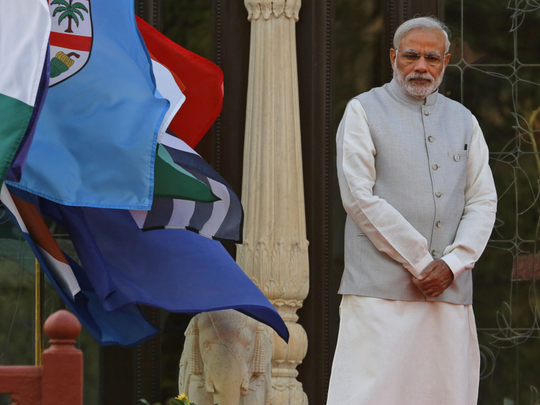
Ever since taking office, Indian Prime Minister Narendra Modi has embarked on an aggressive campaign to court the Indian diaspora. From the United States to Australia, Canada and now the UAE — his persistent engagement with the Indian diaspora has transpired into an integral component of his domestic and foreign policies.
To Modi’s credit he has certainly tried to redefine the relationship of the strong Indian community abroad with that of their motherland. First as chief minister of Gujarat and now as premier, Modi views the diaspora as a persuasive, unexploited force willing and able to fulfil his ambitious goals at home. India’s first prime minister Jawaharlal Nehru viewed the diaspora as a diverse entity, disconnected to core Indian interests. This approach prevailed throughout the last 68 years, resulting in limiting engagement with the diaspora.
This willingness to engage has served Modi well as thousands of NRIs from around the world travelled to India to campaign on his behalf and even filled his campaign coffers, which certainly had a far-reaching impact. In both Madison Square Garden in New York and at Sydney’s Olympic Park, he could have got away by just reading the laundry list. Both were close to his historic electoral victory and Modi had already fulfilled expectations of a large section of expatriate Indians by becoming prime minister. All that the capacity crowds at both venues wanted was to see him in flesh and blood.
In Dubai, though, his engagement was different. Modi delivered a trademark muscular rhetoric speech — impromptu, folksy, showered with little jokes and alliterations, with some policy bragging and the much-used chaiwala (tea seller) self-deprecation. However, to many it sounded more like a Bihar election speech. Strangely, for many, the audience was not eating out of his hands.
Modi’s popularity within the diaspora is because he has effectively branded himself as a man of action, capable of abolishing tortuous bureaucracies, prevalent corruption and dismal poverty — precisely the reasons why millions had left India. His vision and unapologetic ambitions represent the exact qualities that have helped millions of Indians succeed abroad, but they still maintain close ties with their motherland and desperately want it to succeed. However, 15 months into his premiership, not much has transpired on the ground. From the rude and often intruding officials of the dreaded Customs that greet NRIs who are now bragging about India as a world power to the fears of women travelling alone, India is far from being the promised land.
Modi should have been reminded while addressing the capacity crowd at the Dubai Cricket Stadium that those listening to him were more desperate for India to succeed as they would return to their home country after their working lives — unlike their counterparts in the US or Australia.
‘Event manager’
NRIs have always been treated as ‘Mr Money Bags’ by their relatives back home. They come for a holiday, bring chocolates, fancy gifts and absolve themselves of the sins of not being in the country by performing tasks like paying medical bills for even distant relatives. Modi in some ways has treated the NRIs in a similar fashion — as an investment pool for the development of the country. He wants them to help clean the Ganges, invest in government bonds and if possible pick up a few condominiums to boast the ailing real estate market and of course continue to send billions of dollars in remittances.
In return, he is offering sops like not having to ever venture into a police station to report their stay in India. But these lollypops are not as sought-after as the coveted ‘green card’. Modi in his ‘achhey din’ (good times) avatar is yet to deliver the much-bragged about plans for India. India’s infrastructure is still a shambles, bureaucracy still strangles the country and the much promised red carpet for NRI investors is a long way from being rolled out.
Modi, often criticised by his opponents as an “event manager”, not only timed his visit to UAE well — just after his Independence Day speech in New Delhi — but his visit to the Shaikh Zayed Grand Mosque in Abu Dhabi will certainly help soothe nerves as he still is a controversial and polarising figure to many Indians, both within and outside the country. The same qualities that infuse hope and pride in some expatriates instil fear and repulsion in others.
Whether he will be able to win over his critics is yet to be seen, but he has so far played the NRI card to his advantage. He has not only defused the negative publicity he got after the Gujarat pogrom of 2002, but also redefined India’s relationship with its millions of sons and daughters living abroad. But even the dream merchant in him will fail to enthuse further interest and involvement from the diaspora if his government fails on the critical parameters of development.









